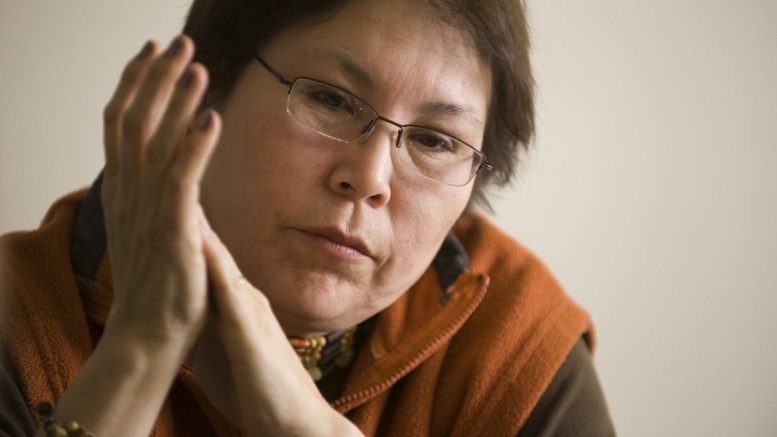Now, the delaying has been put to a halt, and the plaintiffs are finally about to have their true day in court. On Tuesday, a Superior Court judge will begin hearing arguments in what is known as a summary judgment proceeding.
The plaintiffs will attempt to prove that they have enough evidence to forego a trial and prove that Canada had an obligation in law to ensure that indigenous children removed from their homes retain their cultural identity and heritage. The allegations have yet to be proven in court.
“Canada has wielded the knowledge of the judicial system to serve its own purpose; however, we have come to this day, within Canada,” Brown Martel said in an interview from Kirkland Lake, about 250 km north of North Bay.
“It is one of those milestones that one can stand beside and say: ‘The judicial system in Canada, however flawed, however manipulated by those who know how to use it, does come through.’ This may have been a long time, but we are at this place now, and part of the healing is the journey.”
Brown Martel, now 53, was placed in a series of foster homes after being removed from her home. The young Ojibwa girl was later adopted by a non-indigenous family at the age of 9, but the relationship broke down after her adoptive parents separated.
She spent some time with her adoptive mother in Texas, before returning to Beaverhouse around the age of 18, where she later became chief.
“Terror,” is how she describes feeling when the social workers and police came to take her away from home as a child. “No one said anything.”
“I didn’t know these people. I didn’t know different colours of people. All I knew was that these were not my people, and I couldn’t speak to them. I didn’t know that I didn’t speak the same language as them,” she said.
She recalls being told to wash off her “dirty brown colour” in at least one foster home. Years later, she said she would learn from elementary school records that she was described as “mentally retarded,” and not expected to make it past the mental age of 10 years old.
“Those were the kinds of consequences one had for being involved in a community, however caring it may be, that didn’t understand that your base language was a different language,” said Brown Martel, who is no longer able to speak her native language today.
The lawsuit — which has a long, complicated procedural history in the Ontario judicial system — is one of several currently moving through the courts in Canada.
It covers the period from December 1965 — when the federal government signed an agreement with Ontario known as the Canada-Ontario Welfare Services Agreement — to December 1984, when Aboriginality was made an important factor in child protection and placement practices through Ontario’s Child and Family Services Act.
As part of the old agreement, Canada agreed to pay Ontario for the per capita cost of extending some provincial welfare programs to “Indians in the Province,” according to a 2014 Divisional Court ruling dismissing Canada’s appeal of the class action lawsuit’s certification.
“The respondents allege that . . . Canada wrongfully delegated its executive responsibility as guardian, trustee, protector and fiduciary of aboriginal persons by entering into an agreement with Ontario that authorized a child welfare program that systemically eradicated the aboriginal culture, society, language, customs, traditions and spirituality of these children,” wrote Justice Ian Nordheimer on behalf of a three-judge panel.
The plaintiffs — who were asking for $85,000 each in damages in 2014 — allege that many children suffered emotional, psychological and spiritual harm as a result of a loss of connection to their indigenous culture, which led to experiences of lost self-esteem, identity crisis and trauma.
Last week, a spokesman for Indigenous and Northern Affairs Canada said the government could not comment on the Sixties Scoop litigation as it is before the court, while acknowledging that historically, “indigenous children have been harmed in care settings and this has impacted indigenous communities.”
Then on Wednesday, Indigenous Affairs Minister Carolyn Bennett said the government is open to finding a solution to the Sixties Scoop lawsuits.
“We, as you know — as a government — would like to get things out of court and to a table where we can make those kinds of agreements together, as a way forward,” Bennett told reporters in Winnipeg.
“We want to work together with all of the litigants that are presently in court and try and get to the table.”
A number of indigenous leaders called on Prime Minister Justin Trudeau in an open letter last week to resolve the issue without further delay and to “recognize and right an immense wrong — with both words and deeds.”
“This is an opportunity for your government to make a statement about what Canada stands for as it approaches its 150th birthday: a country that respects every person in Canada’s right to live the life they wish to have with all their rights recognized and affirmed,” says the letter.
There’s an important difference between this lawsuit and those in the other provinces, said the plaintiffs’ lead counsel Jeffery Wilson. He pointed out that other lawsuits focus on the actual removal of the child and that it was wrong to place them in non-indigenous care.
“Our case is not about that,” he said. “Our case is this: once removed, for whatever reason, and when placed, for whatever reason, does that end the state’s responsibility to enable the First Nations person to know they are First Nations? So that they are able to exercise their rights as First Nations? Because Canada has a special constitutional relationship with First Nations that it doesn’t have with anyone else.”
Acknowledging that efforts to have the lawsuit dismissed took place under the previous Conservative government, Wilson said he does believe the federal Liberal government, with its message of reconciliation, is committed to searching out a resolution.
“But we are going to court. That speaks for itself,” he said.
Brown Martel plans on attending a rally Tuesday in Toronto outside the courthouse where the hearing on the class-action lawsuit will take place.
“What would I like to see Canada do? To uphold the honourable words of the Prime Minister, Justin Trudeau, to acknowledge the history of this country, to embrace the coming change, and accept that there will be a new way of relationship with indigenous people. It will be good.”
Please visit the source link below to read the entire article.
Source: www.thestar.com





Be the first to comment on "Sixties Scoop Survivors’ Day in Court Finally Arrives Tuesday"